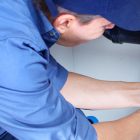Washing machines are essential for keeping our clothes fresh and clean. But what happens when your washer becomes the source of unpleasant odors? Dealing with washing machine smells is a common issue that can make your laundry routine less pleasant. Fortunately, understanding the root causes of washing machine smells and knowing how to troubleshoot them can help you keep your appliance in top shape.
In this detailed guide, we’ll walk you through the different types of washing machine smells, their causes, and practical solutions to eliminate them for good. Whether your washing machine smells like mildew, rotten eggs, or just plain musty, we’ve got you covered!
Contents
Why Do Washing Machines Smell Bad?
If you’ve noticed a bad smell coming from your washing machine, you’re not alone. It’s a common issue faced by many homeowners. Washing machine smells can develop over time, especially in front-loading washers. But why do washing machines smell bad?
The answer often lies in the environment inside your washer. Dark, damp spaces can be a breeding ground for mold, mildew, and bacteria, all of which contribute to those unpleasant washing machine smells. Let’s break it down:
- Mold and Mildew Growth: Washing machines, especially front-loaders, are more prone to mold and mildew because of their airtight seals. Water tends to collect in small spaces like the rubber gasket around the door, providing the perfect conditions for mildew to thrive.
- Detergent Residue: Using too much detergent or using the wrong type of detergent can lead to a buildup of soap scum in the washer drum. This residue traps moisture and dirt, leading to foul odors over time.
- Standing Water: If water doesn’t drain properly, it may pool inside the machine, causing musty smells. Blocked filters, clogged drains, or poorly functioning pumps are common culprits.
- Dirty Drum: After several cycles, debris from clothes, lint, and other particles can get stuck in the washer drum, leading to unpleasant odors.
- Drainage Issues: A clogged or slow-draining hose can cause water to back up into the machine, leading to stagnant water and washing machine smells that resemble rotten eggs.
If any of these factors are at play in your home, it’s time to take action. The good news is, with a little bit of maintenance, you can prevent these smells from developing in the first place. Keep reading to learn how to troubleshoot washing machine smells and get your laundry smelling fresh again.
Common Washing Machine Smells and Their Causes
Not all washing machine smells are created equal. Different odors can indicate different underlying issues. Here’s a breakdown of the most common washing machine smells and what they might mean for your appliance:
- Mildew Smell: A musty, mildew-like smell is the most common odor people encounter. As mentioned earlier, mold and mildew growth are usually responsible. If your washing machine smells like mildew, check the rubber gasket around the door, as this is a prime spot for mildew buildup in front-loaders.
- Sewer Smell: If your washing machine smells like sewage, you might be dealing with a drainage problem. This odor is often caused by standing water or a blocked drain hose, which prevents wastewater from leaving the machine properly. Bacteria in the water create that nasty sewer-like smell.
- Rotten Egg Smell: If your washing machine smells like rotten eggs, you’re likely dealing with sulfur. This odor is usually caused by bacteria growing in the drum or inside the machine’s plumbing. It’s also possible that a clogged filter or drain is causing water to sit and stagnate, leading to that awful eggy odor.
- Burning Smell: A burning smell from your washing machine could indicate a mechanical issue, such as an overheating motor or worn-out belts. If you notice this smell, stop using the machine immediately and call a professional for repairs.
- Sweaty or Musty Smell: Sometimes, the smell isn’t as strong as mildew or sewage, but it still lingers. A general musty or sweaty odor often results from dirt and detergent residue left behind after multiple cycles.
Identifying the source of your washing machine smells is the first step in fixing the problem. The next step? Let’s explore the solutions that will leave your machine smelling fresh and clean again.
How to Get Rid of Washing Machine Smells
Once you’ve identified the cause of your washing machine smells, it’s time to take action. Here are some tried-and-true methods for eliminating unpleasant odors and keeping your washer fresh.
- Clean the Gasket: In front-loading washing machines, the rubber door gasket is a common culprit for mildew growth. Wipe it down regularly with a mixture of hot water and white vinegar or bleach to kill any mold or mildew. Be sure to get into the folds and crevices, where mold can hide.
- Run a Cleaning Cycle: Most modern washing machines have a self-cleaning cycle. Run this cycle at least once a month to flush out any detergent buildup, dirt, and bacteria. Use a washing machine cleaner or a homemade solution of baking soda and vinegar to help neutralize odors.
- Use the Right Detergent: Always use the detergent recommended by the manufacturer, especially if you have a high-efficiency (HE) washer. Using too much detergent or the wrong type can cause buildup, leading to smells. Stick to HE detergents for high-efficiency machines and use them in the proper amounts.
- Leave the Door Open: After each load, leave the washing machine door open to allow the interior to dry out. This simple step prevents moisture from becoming trapped and causing mold or mildew to grow.
- Clean the Filter: Check your machine’s manual to locate the filter and clean it out. A clogged filter can lead to drainage problems, causing water to sit inside the machine and leading to bad smells.
- Clean the Detergent Dispenser: Over time, detergent residue can build up in the dispenser, trapping dirt and moisture. Remove the dispenser and wash it with hot, soapy water to keep it clean and free of buildup.
- Check the Drain Hose: Ensure the drain hose is properly connected and free of blockages. If water isn’t draining as it should, it can cause washing machine smells due to standing water. Disconnect the hose and run hot water through it to clear any clogs.
By incorporating these steps into your regular laundry routine, you can prevent bad smells from developing in the first place. But if your washing machine smells persist, it might be time to call in a professional for help.
How to Prevent Washing Machine Smells in the Future
Prevention is key to avoiding washing machine smells. Here are some tips to help keep your washer smelling fresh and clean for the long haul:
- Use Less Detergent: Overloading your machine with detergent is a surefire way to cause buildup. Follow the recommended amounts and avoid using too much. More detergent doesn’t mean cleaner clothes—in fact, it can do the opposite.
- Run Hot Water Cycles Regularly: Occasionally running a hot water cycle with no clothes can help flush out any lingering bacteria or residue inside the drum. Adding a cup of white vinegar or a special washer cleaner to the cycle can boost the effectiveness.
- Don’t Let Clothes Sit in the Washer: Leaving wet clothes in the washer for too long can lead to mold and mildew growth, causing washing machine smells. Try to transfer your clothes to the dryer as soon as possible after a wash cycle ends.
- Wipe Down the Drum and Gasket: After every wash, quickly wipe down the interior of the drum and the door gasket with a dry cloth. This will help remove any excess moisture that could lead to mold growth.
- Air Out Your Washer: Leaving the door open between loads is a simple yet effective way to let your washer air out. This helps keep moisture at bay and prevents washing machine smells.
- Schedule Regular Maintenance: Every few months, give your washing machine a deep clean. Run a cleaning cycle, clean out the filter, and inspect the hoses for any signs of blockage or wear. Regular maintenance can go a long way in preventing issues before they become problems.
If you follow these tips, you’ll be well on your way to a fresher-smelling washing machine. And if you ever run into issues, remember you can always troubleshoot your washing machine smells with the methods outlined in this guide.
Call a Professional for Stubborn Washing Machine Smells
If you’ve tried everything and your washing machine still smells bad, it might be time to call in a professional. Sometimes, internal components like the pump, motor, or drain system can develop issues that lead to persistent odors. A professional technician can diagnose the problem and perform any necessary repairs to get your machine back in working order.
For professional assistance with washing machine smells, feel free to contact us at +971545356777. We’re here to help you with all your appliance needs, ensuring your washing machine runs smoothly and smells fresh again.



